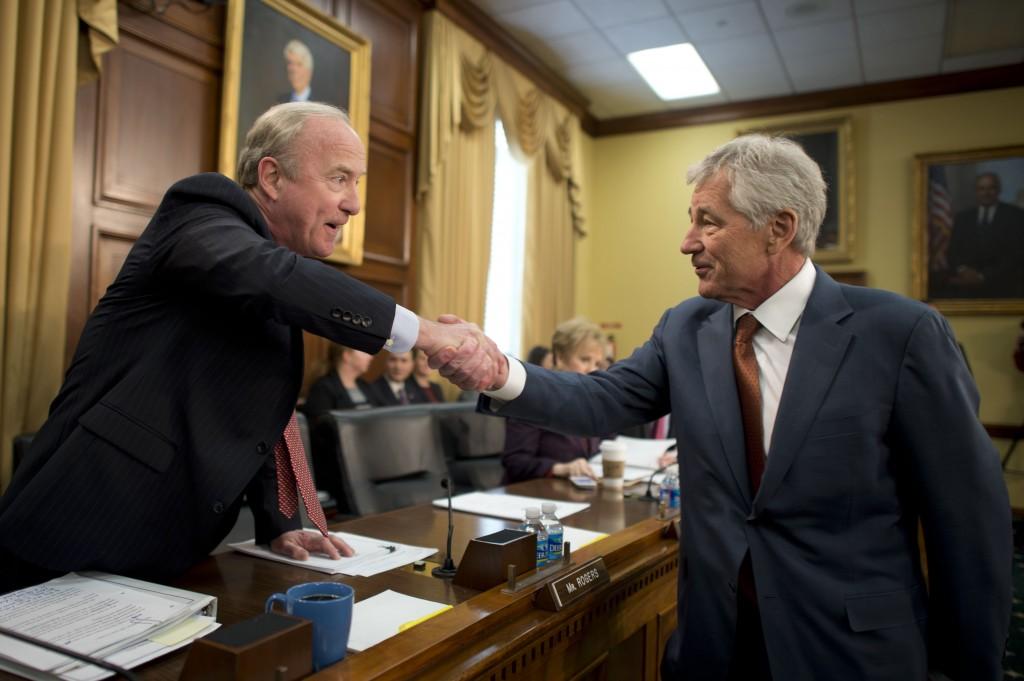Congress and the US Defense budget
Posted By Elsina Wainwright on March 18, 2014 @ 14:00
As Peter Jennings observed in a recent post [2], the Quadrennial Defense Review makes for sobering reading for Americans and allies alike. With its troop and cost reductions and emphasis on modernisation yet discussion of heightened risk, this QDR says as much about the fiscal environment as it does about the strategic environment.
More sobering still have been the House and Senate committee hearings on the accompanying Pentagon budget request. At these hearings Defense Secretary Chuck Hagel, Chairman of the Joint Chiefs of Staff General Martin Dempsey, PACOM Commander Admiral Samuel Locklear and other senior officials have stressed in stark terms the damage to force readiness and national security if Congress doesn’t prevent renewed sequestration. While Defense has been spared its full effects in 2014 and 2015 by a rare bipartisan budget agreement (which revised the Budget Control Act), sequestration resumes in 2016 and beyond, unless Congress repeals or softens it.
The sombre tone of the committee hearings was amplified by the fact that this budget rollout has been confusing to lawmakers as well as analysts. While the Pentagon kept the 2015 budget proposal of US$496 billion within the agreed spending cap, it also requested US$26 billion more for readiness, modernisation and base sustainment. The 2016–2019 budget plan was presented at US$115 billion above the sequestration level, with Defense officials contending that additional sum was needed to implement the QDR strategy, and even then with increased risk. Sequestration, Secretary Hagel said [3], made the risk ‘unacceptable’.
But the plan only specified some of the cuts needed if sequestration returns. Some analysts wondered [4] whether Defense might have missed the chance to set out more systematically, item by item, the actual consequences of sequestration. The submission also contains cost reductions including base closures and modest cuts in compensation growth and housing allowances; these are unlikely to pass in a congressional election year, in which case the Pentagon needs to cut a further US$31 billion from the budget.
Members of Congress sought clarification of this complicated budget, but also signalled that sequestration would continue regardless. In a House Armed Services Committee hearing [5], for example, Committee Chairman Buck McKeon [6] and Ranking Democrat Adam Smith both expressed their strong dislike of sequestration and the effect it was having on the military, while at the same time making clear they saw no politically viable way of overturning it. In the same hearing, General Dempsey stated that failure to make tough decisions now meant ‘we’re eating away at the nation’s readiness for conflict, which does reduce our deterrent capability.’
All the signs are that the Pentagon has an uphill battle with Congress ahead of it. Behind the current impasse is the deeper problem that David Hale flagged in his recent ASPI report [7]: the unsustainable trajectory of entitlement spending (Social Security, Medicare and Medicaid) and congressional gridlock preventing a grand bargain on spending cuts and taxes. The American body politic continues to defer the difficult debate about what kind of society and global posture it’s prepared to fund. Until it has this debate, and even though prominent members of both parties don’t want it, sequestration will stand and Defense will be gouged, because there’s no other option at this time.
What are the implications for the US global posture, particularly its Asia Pacific engagement? Allies shouldn’t panic just yet. The budget contraction is off a very high base, inflated further after years of war. The US military has decades of capability build-up on which to draw, and its technological edge remains extraordinary. The QDR reaffirms that the Asia-Pacific rebalance is a strategic priority [8], ranked first in the list of global priorities. Much of the rebalance has been about strengthening alliances and new security partnerships, supporting regional institutions such as the ASEAN Defense Ministers’ Meeting Plus, and expanding training and exercises—these are less capital intensive and therefore less vulnerable to sequestration than the positioning of military hardware.
Plus, as Peter Jennings noted, there are opportunities for Australia: the US is eager, in these straitened fiscal times, to deepen cooperation with Australia on future capability investments and planning, with a ‘focus on [9] submarine systems and weapons, helicopters, and combat and transport aircraft.’
Nevertheless, the uncertainty of the future budgetary position and the spectre of renewed sequestration are jeopardising the US military’s planning processes and the rebalance. The opposite trajectories of the US and China’s military spend hasn’t been lost on anyone [10] in the Asia Pacific, and nervous allies will be looking for strong indications of continued US commitment from President Obama when he visits the region next month.
Elsina Wainwright is a visiting senior fellow at the Center on International Cooperation, New York University. Image courtesy of U.S. Department of Defense [11].
Article printed from The Strategist: https://aspistrategist.ru
URL to article: /the-us-defense-budget-and-congress/
URLs in this post:
[1] Image: https://aspistrategist.ru/wp-content/uploads/2014/03/Hagel-HAC.jpg
[2] observed in a recent post: https://aspistrategist.ru/united-states-so-long-and-thanks-for-all-the-fish/
[3] Secretary Hagel said: http://www.defense.gov/Releases/Release.aspx?ReleaseID=16568
[4] Some analysts wondered: http://breakingdefense.com/2014/03/so-many-defense-budgets-so-little-clear-direction/
[5] House Armed Services Committee hearing: http://www.c-span.org/video/?318133-1/hearing-fy2015-defense-budget
[6] Committee Chairman Buck McKeon: http://breakingdefense.com/2014/03/dods-26b-budget-hail-mary-not-going-to-happen-rep-mckeon/
[7] recent ASPI report: https://www.aspistrategist.ru/publications/chinas-new-dream-how-will-australia-and-the-world-cope-with-the-re-emergence-of-china-as-a-great-power
[8] reaffirms that the Asia-Pacific rebalance is a strategic priority: http://www.defense.gov/Speeches/Speech.aspx?SpeechID=1775
[9] focus on: http://www.defense.gov/pubs/2014_Quadrennial_Defense_Review.pdf
[10] hasn’t been lost on anyone: https://aspistrategist.ru/shoud-we-worry-about-chinas-defence-spending/
[11] U.S. Department of Defense: http://www.defense.gov/homepagephotos/homepagephotos.aspx
Click here to print.
